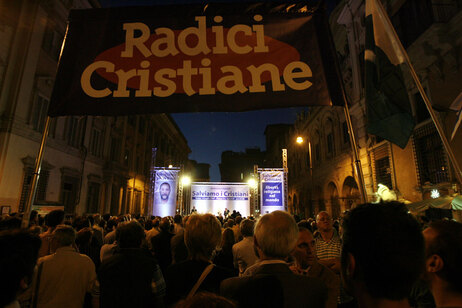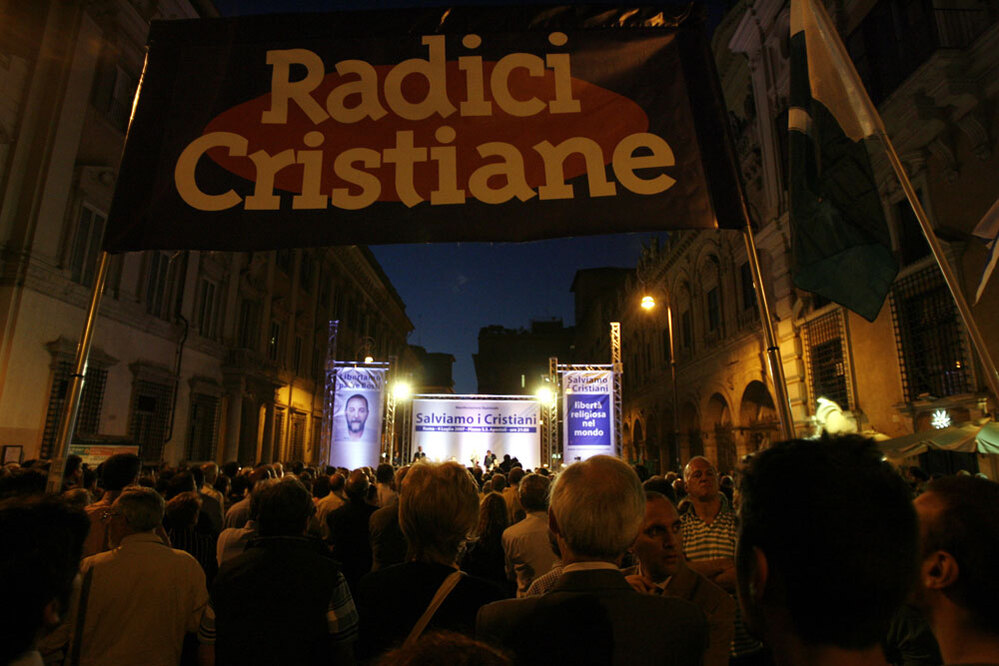The chances are that one in five of the people there find "spiritual energy" in mountains or trees, and one in six believe in the "evil eye," that certain people can cast curses with a look — beliefs your Christian pastor doesn't preach.
In a Catholic church? Chances are that one in five members believe in reincarnation in a way never taught in catechism class — that you'll be reborn in this world again and again.
Elements of Eastern faiths and New Age thinking have been widely adopted by 65% of U.S. adults, including many who call themselves Protestants and Catholics, according to a survey by the Pew Forum on Religion & Public Life released Wednesday.
"Mixing and matching practices and beliefs is as much the norm as it is the exception," Pew's Alan Cooperman says. "Are they grazing, sampling, just curious? We really don't know."
Even so, says Pew researcher Greg Smith, "these findings all point toward a spiritual and religious openness — not necessarily a lack of seriousness."
Among the findings:
•26% of those who attend religious services say they do so at more than one place occasionally, and an additional 9% roam regularly from their home church for services.
•28% of people who attend church at least weekly say they visit multiple churches outside their own tradition.
•59% of less frequent church attendees say they attend worship at multiple places.
The survey of 2,003 adults Aug. 11-27 has a margin of error of plus or minus 2.5 percentage points. It measures Protestants, Catholics and the unaffiliated; there were not enough people of other faiths surveyed for analysis.
"For an extremely long time, most of us thought belonging or membership or home church was monogamous, even if it was serial monogamy, because we all know about church-switching," says sociologist of religion Scott Thumma, a professor at the Hartford Institute for Religion Research in Hartford, Conn. "Today, the individual rarely finds all their spiritual needs met in one congregation or one religion."
Pew says two in three adults believe in or cite an experience with at least one supernatural phenomenon, including:
•26% find "spiritual energy" in physical things.
•25% believe in astrology.
•24% say people will be reborn in this world again and again.
•23% say yoga is a "spiritual practice."
"One hundred years ago, it would have been 'spiritualism.' They wouldn't have known what yoga was but might have been attracted to the 'New Thought' of the time," Mohler says.
His former classmate giggles at that. She's an ordained minister in the progressive United Church of Christ and leads the Interfaith Family Project, which meets for weekly worship at a Silver Spring, Md., high school.
Jarvis, of Takoma Park, Md., also studies with Buddhist teacher Thich Nhat Hanh and finds a spiritual dimension in yoga.
"I don't do astrology, but my mother, who grew up in Birmingham, Ala., and was a staunch Baptist all her life, looked at her horoscope daily and totally believed it," Jarvis says.
Jarvis says her late mother, like 49% of adults in the Pew survey, also had a moment of "religious or spiritual awakening."
"My mother feared for years that I was no longer saved, but just two days before she died, she had an epiphany," Jarvis says. "She said she was 'told' in a spiritual experience to put aside all religious and political differences and just love each other. That was her blessing to me, and that's what I'm doing."
Regina Roman of Alexandria, Va., calls herself "a very grounded Episcopalian" who's active in her church. But, she says, "I'm also stretching the boundaries of how we are to be here and now in this day, age and culture."
She leads pilgrimages to Egypt, New Mexico and Ireland to help travelers discover the truths and visions in Coptic, Native American and Celtic traditions. Roman celebrated the winter solstice with a home ceremony for guests to delight in the sun's gifts.
"We are all in relationship with the cosmos. We need to honor that," says Roman, who doesn't see herself crossing barriers but rather "coming full circle" with ancient ideas.
"People have always mixed religions, either in ignorance or willfully," says Stephen Prothero, director of the Graduate Division of Religious and Theological Studies at Boston University.
The faith-mixing trend has been building; other surveys in the past two years have touched on the swirling, unbounded paths of believers:
•Forty-seven percent to 59% of Americans have changed religions at least once, a Pew survey in April found. The top reasons for most: Their spiritual needs weren't being met, or they liked another faith more or changed religious or moral beliefs.
•The percentage of people who call themselves Christian has dropped more than 11% in a generation, and so many people declined any religious label that the "Nones," now 15% of the USA, are the third-largest "religious" group after Catholics and Baptists, according to the American Religious Identification Survey last March.
•Despite Americans' overwhelming allegiance to someone they call God (92%), in Pew's 2008 U.S. Religious Landscape Survey, 70% said "many religions can lead to eternal life," and 68% said "there's more than one true way to interpret the teachings of my religion."
•Most (55%) say a guardian angel has protected them from harm, and 52% believe in prophetic dreams, according to surveys by Baylor University released in 2006 and 2008.
____________________________________________________________________
JMC Ministries Response
It has been prophesied that there will be a great falling away, even from the very elect.
Matthew 24:24For false Christs and false prophets will appear and perform great signs and miracles to deceive even the elect—if that were possible.
So this is no surprise to me that this is happening. The body of Christ needs to wake up and teach against these false doctrines that are going around. Too many churches seem to be afraid to speak up against these acts, and others are incorporating them into their services and daily lives.
The scriptures are very clear about this. That we should remove any hint of sin from the church and that we then teach only the truth found in the text of the Bible. That we are not to add or take away anything from the Holy Word.
Christians it is time to repent of our ways as the whole body of Christ and remove this speck from our own eyes so we can remove it from others later.
I pray that God continues to reveal Himself to the people, and that we turn back from our wicked ways.


